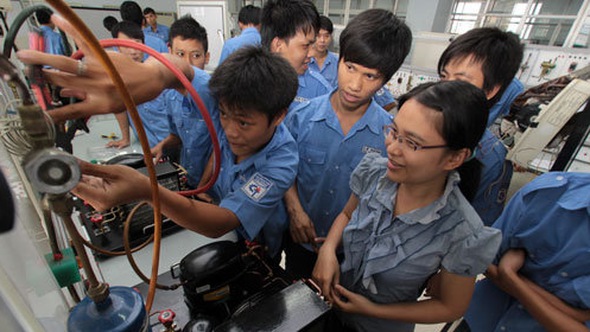Even though they are admitted to university, more young people are choosing vocational schools to ensure a ‘more stable and better future’
Many young Vietnamese have turned to vocational schools shortly after their university admission, believing that it is better to be a skilled worker than an incapable college graduate.
With so many fresh graduates, even those with master’s degree failing to land a suitable job or having to accept work in fields that have nothing to do with the majors in which they are professionally trained, many Vietnamese youth are seeing a better future in vocational schools.
Job ensured after graduation
At the Dung Quat Vocational College of Technique and Technology, in the central province of Quang Ngai, Tuoi Tre (Youth) newspaper met four young men who had left their university admissions behind in order to become a worker.
Two of them had been admitted to Quy Nhon University in the south-central province of Binh Dinh, one to the University of Economics, Ho Chi Minh City and another to the Ho Chi Minh City University of Culture.
But none of these young men, all hailing from the Central Highlands province of Dak Lak, will begin their student life.
Instead, they have applied for a high-quality program at the Dung Quat vocational college and will become skilled auto mechanic engineers after three years.
Each of the young men has their own reasons for making the choice.
“Many people in my village remained unemployed after their university graduation and some have had to work at coffee plantations,” one man, Y Chuan, said of his decision.
“In the meantime, there is huge demand for auto mechanics in my province, given the number of farming vehicles being used for coffee growing, but few are qualified for the job.”
The second young man, K Khanh, said he had first thought of landing a job at a state office, but was later discouraged, knowing that the meager salary would not be enough to make ends meet.
“Then I learned of this high-quality program for auto mechanics with a more promising future and did not hesitate to apply,” Khanh said.
Khanh said he plans to work for Truong Hai Auto, one of Vietnam’s biggest automakers, after graduating from the vocational college to gain experience before “opening my own garage.”
For K Co and K Duong, graduating from a vocational school means they will almost certainly land a job with a monthly income of at least VND6 million ($264).
“We will have to take loans to afford college and may be unable to repay these debts after graduation,” Duong said.
Many university students have decided to quit their college dream midway, and turned to vocational training.
Le Huy Tin finished his first year at the Da Nang Architecture University when he decided to quit and applied for the auto mechanic program at the Dung Quat vocational college.
Tin began his higher education much later than his friends. When he was a freshman at the Da Nang Architecture University, his peers had already graduated and began looking for jobs.
“Seeing my friends struggle to find a suitable job encouraged me to quit university,” Tin said.
Tin said he had worked as a mechanic in Ho Chi Minh City and made VND5 million ($220) a month “even though I was not really skilled.”
“So I wanted to improve my skills and enrich my knowledge at the Dung Quat vocational college,” he said.
“After graduation, I will work in Japan as some of the vocational school graduates have found good jobs with high income there.”
According to experts, one of the main reasons for the glut of university graduates unable to find a suitable position is that what they are trained is of little use in the actual job market.
“Many business leaders have pointed out that the curricula of many universities in Vietnam are problematic and outdated,” Prof. Truong Nguyen Thanh, vice chancellor of Hoa Sen University in Ho Chi Minh City, told Thanh Nien (Young People) newspaper.
“While technology is changing rapidly – we have a new piece of tech every six months or a year – what is taught in the four-year university program [in Vietnam] remains unchanged for decades.”

























































